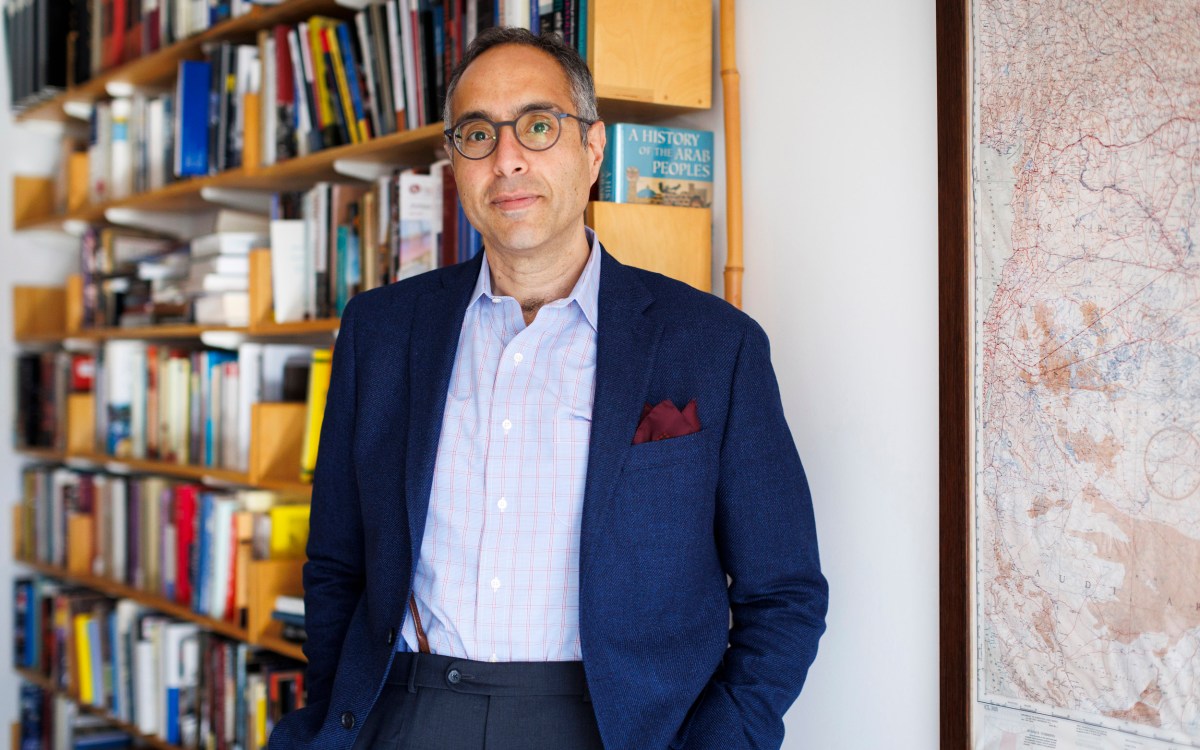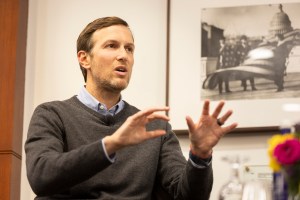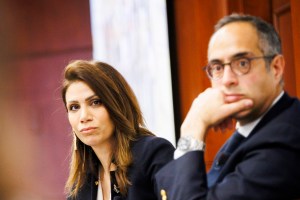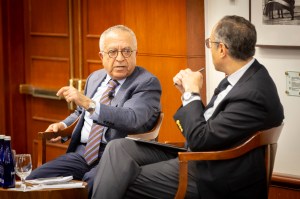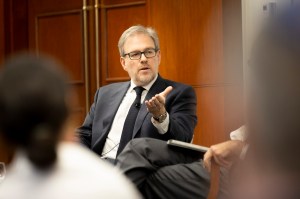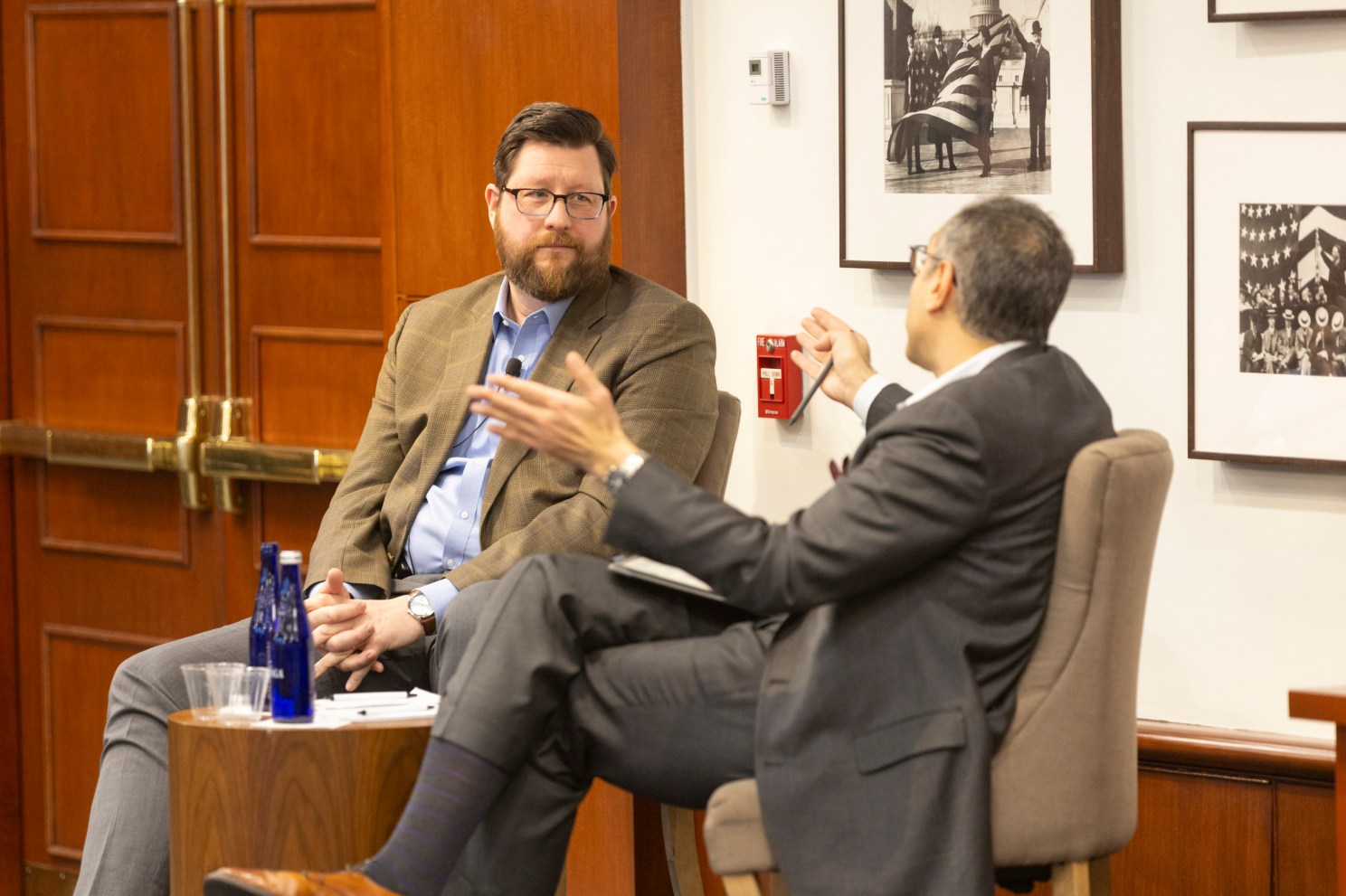
Matt Duss (left) and Tarek Masoud.
Niles Singer/Harvard Staff Photographer
Ex-Sanders aide calls for U.S. to take harder line with Israel
Sustained assault ‘indefensible,’ Duss says. Kennedy School’s Masoud disputes arguments on governance of Gaza, history of conflict.
The conflict between the Israelis and the Palestinians can be resolved without a two-state solution if Israel ends its military assault on Gaza and the U.S. withdraws support for Israeli Prime Minister Benjamin Netanyahu, according to Matt Duss, who served as foreign policy adviser to Sen. Bernie Sanders of Vermont from 2017 to 2022.
Duss and Tarek Masoud, Ford Foundation Professor of Democracy and Governance and faculty director of the Middle East Initiative at Harvard Kennedy School, engaged in a spirited conversation Feb. 29 at the Kennedy School about the Israel-Hamas conflict. It was the second in a series of Middle East talks Masoud has convened this semester with voices across the ideological spectrum. Jared Kushner, a one-time senior adviser to former President Donald Trump, earlier this month.
“My interlocutors in these discussions could not be more different from each other in terms of their beliefs, commitments, and analyses of the present situation,” Masoud wrote when the spring lineup was announced. “But they have been chosen because they represent points of view that I believe anyone who cares about the region can ill afford ignore.”
Duss supports a cease-fire in Gaza and called Israel’s sustained bombardment of the territory, launched in response to the Oct. 7 terror attack by Hamas, “indefensible.” The assault by Hamas left 1,200 dead and included sexual violence and torture. The group took more than 200 hostages. Israeli strikes in the months since have killed more than 30,000, according to Gaza’s health ministry, and crippled healthcare efforts.
“Israel has the right to protect its people, as does every country. It does not have the right to determine, by itself, what is appropriate and inappropriate,” Duss told Masoud before an audience made up largely of Masoud’s students. “And I think it’s very clear that Israel has in this conflict and in previous conflicts and frankly, throughout the process of the occupation, violated a whole set of those standards.”
Netanyahu’s promise to ensure that Israel never faces another Oct. 7 attack is “a legitimate goal,” said Duss, executive vice president of the Center for International Policy in Washington. But because trying to do so by wiping out Hamas is not “realistic,” he said, the scale and intensity of Israel’s assaults need to be questioned.
Asked about options for post-war governance of Gaza, Duss said that “none of them are great,” especially if Israeli forces maintain a presence in the territory. “That’s a problem,” he said. Restoring the Palestinian Authority would also be “extremely problematic,” given its corruption and ineffectiveness.
One possibility might be a “transitional trusteeship” overseen by an international coalition, according to Duss.
“I do think whatever kind of solution we arrive at, what is going to make it effective at all” is the U.S.-led community showing “that we are committed to following through on the promise, finally, of Palestinian liberation,” he said.
Calling talk of a two-state solution “an easy out” for U.S. lawmakers to avoid addressing the crisis at hand, Duss insisted that there is a land-sharing scenario in which Israelis and Palestinians can peacefully coexist. Skeptical that Palestinian statehood would weaken Hamas, Masoud noted that such an arrangement would be a “huge risk” for Israel. Duss conceded the point, saying it would “take time” to finesse.
“The challenge of the so-called peace process is that the international community basically made a promise to the Palestinians: ‘End violence, end terrorism, commit to nonviolence and the democratic process, and you’ll have self-determination,’” he said. “And we have shown them that that is not true.”
The situation amounts to “a recruiting program for Hamas,” allowing the group to tell the Palestinian people that everything they’ve heard about “this process has been a lie.”
Masoud sharply disagreed. “It wasn’t a lie. It was true! And then, every time that the Palestinians were offered a deal, they turned it down.”
But while Duss blamed the Palestinians for “some bad choices,” he said it was “simplistic” to claim they have spurned every potential deal.
Leaders on both sides have made “enormous mistakes,” he said.



